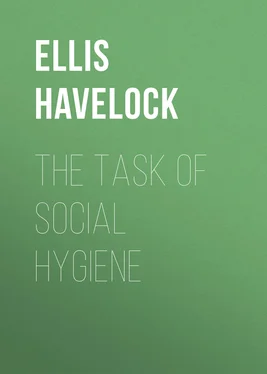Havelock Ellis - The Task of Social Hygiene
Здесь есть возможность читать онлайн «Havelock Ellis - The Task of Social Hygiene» — ознакомительный отрывок электронной книги совершенно бесплатно, а после прочтения отрывка купить полную версию. В некоторых случаях можно слушать аудио, скачать через торрент в формате fb2 и присутствует краткое содержание. Жанр: psy_sex_and_family, foreign_psychology, foreign_edu, на английском языке. Описание произведения, (предисловие) а так же отзывы посетителей доступны на портале библиотеки ЛибКат.
- Название:The Task of Social Hygiene
- Автор:
- Жанр:
- Год:неизвестен
- ISBN:нет данных
- Рейтинг книги:5 / 5. Голосов: 1
-
Избранное:Добавить в избранное
- Отзывы:
-
Ваша оценка:
- 100
- 1
- 2
- 3
- 4
- 5
The Task of Social Hygiene: краткое содержание, описание и аннотация
Предлагаем к чтению аннотацию, описание, краткое содержание или предисловие (зависит от того, что написал сам автор книги «The Task of Social Hygiene»). Если вы не нашли необходимую информацию о книге — напишите в комментариях, мы постараемся отыскать её.
The Task of Social Hygiene — читать онлайн ознакомительный отрывок
Ниже представлен текст книги, разбитый по страницам. Система сохранения места последней прочитанной страницы, позволяет с удобством читать онлайн бесплатно книгу «The Task of Social Hygiene», без необходимости каждый раз заново искать на чём Вы остановились. Поставьте закладку, и сможете в любой момент перейти на страницу, на которой закончили чтение.
Интервал:
Закладка:
The era of social reform followed on the rise of modern industrialism, and, no doubt largely on this account, although an international movement, it first became definite and self-conscious in England. There were perhaps other reasons why it should have been in the first place specially prominent in England. When at the end of the seventeenth century, Muralt, a highly intelligent Swiss gentleman, visited England, and wrote his by no means unsympathetic Lettres sur les Anglais , he was struck by a curious contradiction in the English character. They are a good-natured people, he observed, very rich, so well-nourished that sometimes they die of obesity, and they detest cruelty so much that by royal proclamation it is ordained that the fish and the ducks of the ponds should be duly and properly fed. Yet he found that this good-natured, rich, cruelty-hating nation systematically allowed the prisoners in their gaols to die of starvation. "The great cruelty of the English," Muralt remarks, "lies in permitting evil rather than in doing it." 1 1 Muralt, Lettres sur les Anglais . Lettre V.
The root of the apparent contradiction lay clearly in a somewhat excessive independence and devotion to liberty. We give a man full liberty, they seem to have said, to work, to become rich, to grow fat. But if he will not work, let him starve. In that point of view there were involved certain fallacies, which became clearer during the course of social evolution.
It was obvious, indeed, that such an attitude, while highly favourable to individual vigour and independence, and not incompatible with fairly healthy social life under the conditions which prevailed at the time, became disastrous in the era of industrialism. The conditions of industrial life tore up the individual from the roots by which he normally received strength, and crowded the workers together in masses, thus generating a confusion which no individual activity could grapple with. So it was that the very spirit which, under the earlier conditions, made for good now made for evil. To stand by and applaud the efforts of the individual who was perhaps slowly sinking deeper and deeper into a miry slough of degradation began to seem an even diabolical attitude. The maxim of laissez-faire , which had once stood for the whole unfettered action of natural activities in life, began to be viewed with horror and contempt. It was realized that there must be an intelligent superintendence of social conditions, humane regulation, systematic organization. The very intensity of the evils which the English spirit produced led to a reaction by which that spirit, while doubtless remaining the same at heart, took on a different form, and manifested its energy in a new direction.
The modern industrial era, replacing domestic industry by collective work carried out by "hands" in factories, began in the eighteenth century. The era of social reform was delayed until the second quarter of the nineteenth century. It has proceeded by four successively progressive stages, each stage supplementing, rather than supplanting, the stage that preceded it. In 1842 Sir Edwin Chadwick wrote an official Report on the Sanitary Condition of the Labouring Population of Great Britain , in which was clearly presented for the first time a vivid, comprehensive, and authoritative picture of the incredibly filthy conditions under which the English labouring classes lived. The times were ripe for this Report. It attracted public attention, and exerted an important influence. Its appearance marks the first stage of social reform, which was mainly a sanitary effort to clear away the gross filth from our cities, to look after the cleansing, lighting, and policing of the streets, to create a drainage system, to improve dwellings, and in these ways to combat disease and to lower the very high death-rate.
At an early stage, however, it began to be seen that this process of sanitation, necessary as it had become, was far too crude and elementary to achieve the ends sought. It was not enough to improve the streets, or even to regulate the building of dwellings. It was clearly necessary to regulate also the conditions of work of the people who lived in those streets and dwellings. Thus it was that the scheme of factory legislation was initiated. Rules were made as to the hours of labour, more especially as regards women and children, for whom, moreover, certain specially dangerous or unhealthy occupations were forbidden, and an increasingly large number of avocations were brought under Government inspection. This second stage of social reform encountered a much more strenuous opposition than the first stage. The regulation of the order and cleanliness of the streets was obviously necessary, and it had indeed been more or less enforced even in medieval times; 2 2 In the reign of Richard II (1388) an Act was passed for "the punishment of those which cause corruption near a city or great town to corrupt the air." A century later (in Henry VII's time) an Act was passed to prevent butchers killing beasts in walled towns, the preamble to this Act declaring that no noble town in Christendom should contain slaughter-houses lest sickness be thus engendered. In Charles II's time, after the great fire of London, the law provided for the better paving and cleansing of the streets and sewers. It was, however, in Italy, as Weyl points out ( Geschichte der Sozialen Hygiene im Mittelalter , at a meeting of the Gesellschaft für Soziale Medizin, May 25, 1905), that the modern movement of organized sanitation began. In the thirteenth century the great Italian cities (like Florence and Pistoja) possessed Codici Sanitarii ; but they were not carried out, and when the Black Death reached Florence in 1348, it found the city altogether unprepared. It was Venice which, in the same year, first initiated vigorous State sanitation. Disinfection was first ordained by Gian Visconti, in Milan, in 1399. The first quarantine station of which we hear was established in Venice in 1403.
but the regulation of the conditions of work in the interests of the worker was a more novel proceeding, and it appeared to clash both with the interests of the employers and the ancient principles of English freedom and independence, behind which the employers consequently sheltered themselves. The early attempts to legislate on these lines were thus fruitless. It was not until a distinguished aristocratic philanthropist of great influence, the seventh Earl of Shaftesbury, took up the question, that factory legislation began to be accepted. It continues to develop even to-day, ever enlarging the sphere of its action, and now meeting with no opposition. But, in England, at all events, its acceptance marks a memorable stage in the growth of the national spirit. It was no longer easy and natural for the Englishmen to look on at suffering without interference. It began to be recognized that it was perfectly legitimate, and even necessary, to put a curb on the freedom and independence which involved suffering to others.
But as the era of factory legislation became established, a further advance was seen to be necessary. Factory legislation had forbidden the child to work. But the duty of the community towards the child, the citizen of the future, was evidently by no means covered by this purely negative step. The child must be prepared to take his future part in life, in the first place by education. The nationalization of education in England dates from 1870. But during the subsequent half century "education" has come to mean much more than mere instruction; it now covers a certain amount of provision for meals when necessary, the enforcement of cleanliness, the care of defective conditions, inborn or acquired, with special treatment for mentally defective children, an ever-increasing amount of medical inspection and supervision, while it is beginning to include arrangements for placing the child in work suited to his capacities when he leaves school.
Читать дальшеИнтервал:
Закладка:
Похожие книги на «The Task of Social Hygiene»
Представляем Вашему вниманию похожие книги на «The Task of Social Hygiene» списком для выбора. Мы отобрали схожую по названию и смыслу литературу в надежде предоставить читателям больше вариантов отыскать новые, интересные, ещё непрочитанные произведения.
Обсуждение, отзывы о книге «The Task of Social Hygiene» и просто собственные мнения читателей. Оставьте ваши комментарии, напишите, что Вы думаете о произведении, его смысле или главных героях. Укажите что конкретно понравилось, а что нет, и почему Вы так считаете.












